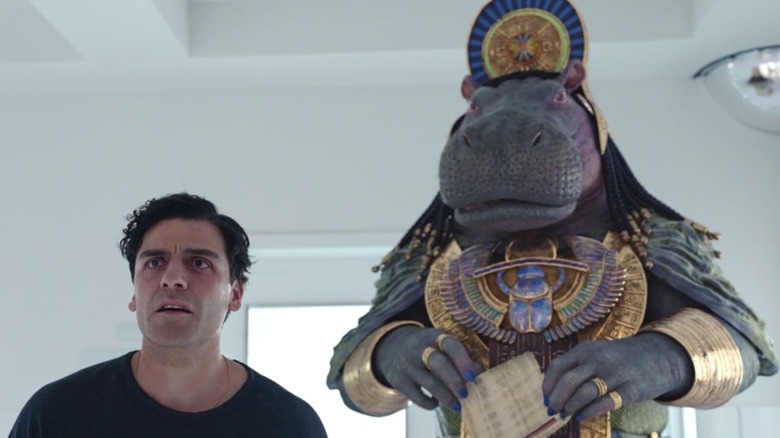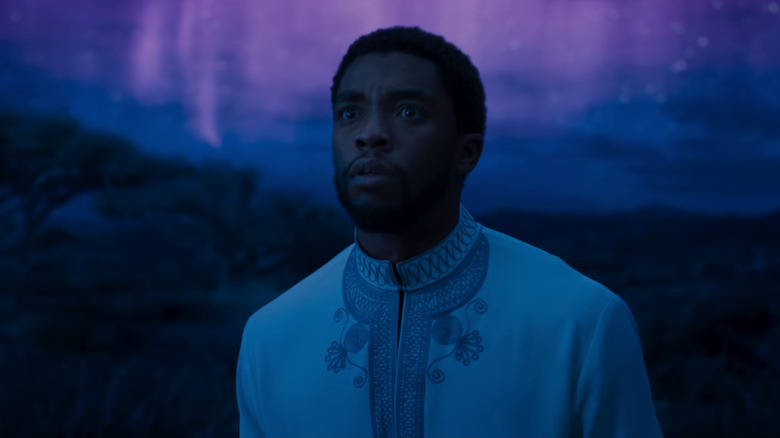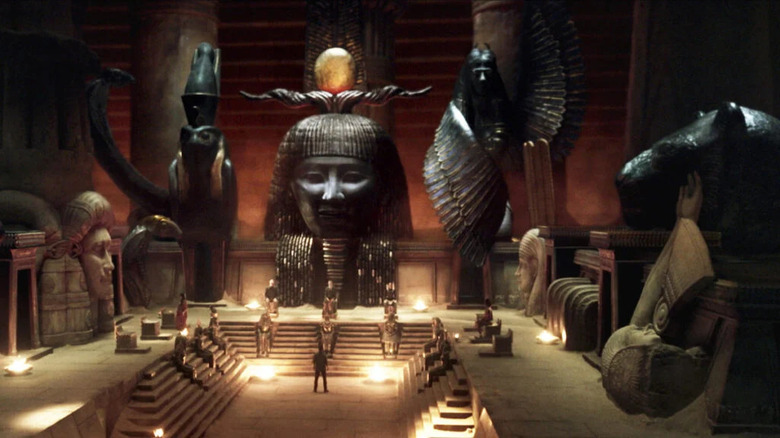How The New Episode Of Moon Knight Connects To Black Panther
This post contains spoilers for the latest episode of "Moon Knight."
"Moon Knight" is truly a special show within the Marvel Cinematic Universe, in part because it has little connection to it. It is a show with incredible performances, and a story that is less focused on the mystery box and more of an intimate psychological story about mental health.
This latest episode finds Steven and Marc exploring the Egyptian afterlife of Duat, facing the judgment of Anubis with their hearts weighed against a feather while on a boat surrounded by the spirits of the dead. It's a very introspective episode that gets at the heart of Steven and Marc's shared trauma and relationship, but it is also an episode with a very interesting (and rare, for this series) connection to the rest of the MCU. Particularly "Black Panther."
Praise Bast
After meeting the hippopotamus deity Tawaret, Marc asks if they are in the afterlife, to which Tawaret clarifies that this is "an afterlife, not the afterlife," and teases Steven and Marc about "how many intersectional planes of untethered consciousness exist." One of those planes? The Ancestral Plane, which Tawaret calls "just gorgeous."
The Ancestral Plane, of course, is the afterlife from Marvel's "Black Panther," where those who eat the Heart-Shaped Herb can commune with their ancestors. It is also the final test before becoming the titular Black Panther. This plane, much like the Duat, takes different forms depending on each person. For T'Challa, it looks like a gorgeous savanna with aurora borealis localized entirely within its purple skies. For N'Jadaka, aka Killmonger, it took the form of his home in Oakland — still with the purple skies.
By showing an Egyptian deity recognize a Wakandan afterlife, "Moon Knight" makes the concept of the afterlife universal, removed of cultural or religious specificity and limitations. All backgrounds and beliefs are equally valid. But more curiously, this mention runs deeper, with implications for the future of the MCU.
What this means
In "Captain America: Civil War," T'Challa tells Natasha after his father's death that:
"In my culture, death is not the end. It's more of a stepping off point. You reach out with both hands and Bast and Sekhmet, they lead you into a green veld where... you can run forever."
"Black Panther" expands on Bast, the Panther God, protector of Wakanda and the Panther Clan. In our world, Bast is actually an Egyptian deity, goddess of protection and pleasure. Likewise, Sekhmet is an Egyptian solar god, and sister to Bast.
This seems to suggest the idea that the world of "Black Panther" and "Moon Knight" are intricately connected, and that Bast is the same god of both cultures. Maybe she simply left the Egyptian pantheon and went to another part of the continent, but retained the concept of an avatar in Wakanda the same way Khonshu and the other gods have avatars. In Marvel comics lore, Bast is the offspring of Ra, who once led the Ennead pantheon we met in episode three. Last week, we saw a book in Harrow's office titled "Royal Necropolis," which in the comics is the city where previous Black Panthers are buried and where the Heart-Shaped Herb is grown. There are no mentions of Asgardian gods in "Moon Knight," but the fact that there are references to "Black Panther" seems to indicate that all of these godly pantheons are closely tied together.
Maybe Marvel is slowly but surely connecting all their god-related properties for a good reason. "Thor: Love and Thunder" is set to introduce the character of Gorr the God-Butcher, who in the comics sets out on a quest to kill every pantheon of gods in the universe. We know Zeus is also going to appear in the film, with the trailer seemingly teasing Olympus, so it's possible Bast or Khonshu will also be hunted by Gorr at one point.


